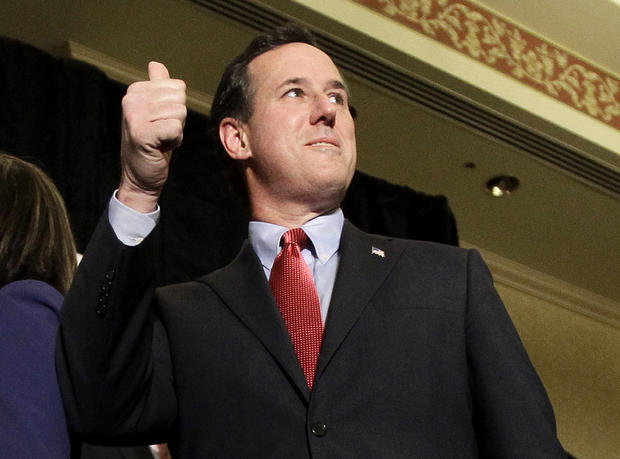Rick Santorum finally gets his moment
Don't look now, but Rick Santorum has now won four of the eight states that have held contests so far - more than Mitt Romney, Newt Gingrich or Ron Paul.
Well, more or less.
Last month, Santorum was belatedly declared the winner of the Iowa caucusesafter a recount showed him edging out rival Mitt Romney in that contest - though that win came with an asterisk, since not all the ballots could be certified. Still, Santorum had a point when he complained that the delay in his being declared the winner cost him valuable momentum coming out of the closely-watched caucuses.
On Tuesday, Santorum won three more states, Colorado, Missouri and Minnesota - though once again, he can't quite claim clean victories. The Missouri primary was little more than a "beauty contest," since the state is awarding its delegates based not on the primary but on the caucuses it will hold on March 17. Gingrich dismissed the contest and wasn't even on the ballot, having declined to pay the necessary fee; Romney and Paul, meanwhile, paid little attention to the state.
Missouri election results
Colorado election results
Minnesota election results
Estimated Republican Delegate Scorecard
Full GOP primary results
Santorum's victories in Minnesota and Colorado have a little more juice: Both are states Romney won easily in 2008. Yet again, there are reasons not to get carried away with the results. Like the Iowa caucuses last month, the Minnesota and Colorado caucuses tonight don't officially award any delegates - a big part of the reason they attract just a tiny percentage of each state's registered voters. These caucus-goers tend to be among the most committed participants in the political process, and they skew more conservative than more casual Republican voters. If Santorum couldn't pull out wins in contests like these, he would have had a hard time justifying the fact that he is in the race at all.
Still, there's no question that it was an extremely good night for Santorum. He can now claim four contests - three more than Gingrich - which gives him a legitimate basis to argue that he is the true conservative alternative to the front-runner Romney.
Rick Santorum sweeps Missouri, Minnesota, Colorado
Gingrich has been in freefall ever since his South Carolina win, having been outshone on the debate stage and beaten in five states - and he doesn't have a good opportunity to turn things around anytime soon. There isn't another debate for two weeks, and Romney is the strong favorite to win the two big primaries that come on February 28, in Arizona and Michigan. Gingrich's current strategyis to try to hold on until Super Tuesday, when he hopes he can start scoring wins in Southern primaries. But it's a long time until March 6, and the momentum belongs to his rivals.
The Romney camp, meanwhile, appears a little spooked. Romney surrogate Tim Pawlenty, the former Minnesota governor and onetime GOP presidential candidate, went after Santorum on Monday over his spending record in Congress. And while the Romney camp played down the importance of Tuesday's contests before the vote, it was concerned enough to spend money on mailers in Minnesota attacking Santorum in the run-up to the caucuses.
The Romney campaign's attacks prompted one Santorum adviser to say that "[i]t's a badge of honor that Romney has decided to try to destroy us." He's got a point. The Romney campaign wouldn't be going after Santorum if it wasn't at least a little worried that the former Pennsylvania senator is a legitimate threat. And that's not their only problem: Romney's inability to win in Minnesota and Missouri raises renewed questions about both his ability to win over conservatives and his strength in the Midwest, where he has now gone zero-for-three.
Despite what happened on Tuesday, the conventional wisdom that Romney is likely to win hasn't changed. But for perhaps the first time, the notion that Santorum could win the nomination can't easily be dismissed. Romney is at just 29 percent in a new Reuters/Ipsos national poll - not the sort of number that screams front-runner - followed by Paul at 21 percent, Gingrich at 19 percent and Santorum at 18 percent. If Santorum can build on his momentum and skim off a good chunk of Gingrich's support, he could find himself neck-in-neck with Romney in national polls.
And it's not inconceivable that it is Santorum, not Gingrich, who finds himself starting to rack up delegates in the Southern states come Super Tuesday. After all, it is Santorum, not Gingrich, who seems to be the closest candidate to Mike Huckabee remaining in the GOP field; Huckabee won five southern primaries in the 2008 cycle, on the strength of the very same social conservative credibility that has powered Santorum so far.
Again, it's important to maintain some perspective: The four states that Santorum has now won are a "beauty contest" primary and three low turnout caucuses. He remains a longshot to win the nomination, and most political insiders still expect to look back on Tuesday night as a bump in the road on Romney's march to the general election. But Santorum will get a boost out of Tuesday night's results, and particularly in this topsy-turvy GOP contest, you never know where a candidate who catches fire at the right time might end up.
